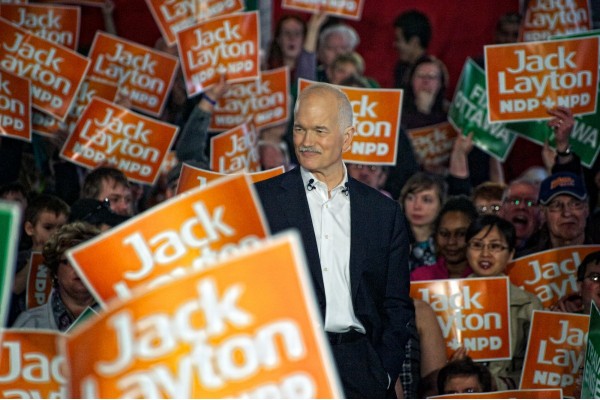It’s time for the NDP to embrace democracy
The NDP needs a coherent and compelling message centred around building a more participatory democratic society

Photo by Obert Madondo/Flickr
Even before the abysmal final election verdict was announced, leftists were analyzing what was clearly amounting to a collapse of the federal NDP. There are many takes as to where the party should go next—including, of course, the never-ending debate over how radical or moderate they should be—but one recurring theme between them is that the party is in dire need of a clear, overarching direction. The policies under Jagmeet Singh varied in quality and scale but were too often put forward reactively in response to the positions of other parties and (often poor) interpretations of public polling. This rudderless tendency culminated in the bizarre “tearing up” of the supply and confidence agreement without identifying a dividing issue. Mark Carney, by contrast, was remarkably clear about the principles guiding his economic philosophy even if he heavily adjusted the policy specifics to the moment. Indeed, some of Carney’s advertisements were simply him talking shop without bothering to even mention the other parties. Though many on the left objected to Carney’s vision, they wanted the alternative to be presented as seriously.
Though much of the party’s focus will now necessarily shift towards the selection of a compelling leader, that leader will also need a more vibrant and shared raison d’etre with which to galvanize voters. As the NDP goes back to the proverbial drawing board it seems appropriate that they examine that second word in their own name: democratic. We have seen how a lack of economic democracy can lead to political democracy getting swallowed by oligarchs; a recurring theme that goes back to ancient Greece. Democracy in Canada is now severely lacking both politically and economically, and the public feels it. Moreover, it is lacking as a priority among other parties in both arenas (Carney has now demoted the Minister of Labour to a supporting “Secretary of State” role while removing electoral reform champion Nate Erskine-Smith from cabinet). It makes sense, as the NDP recalibrates, that they commit themselves to being the party building democracy all the way through—in both government and enterprise—so that we have a properly democratic society.
Concretely, this means having an agenda that includes a proportional electoral system that ends the strategic voting straitjacket, a baseline minimum level of democracy in any enterprise of scale, and the promotion of more rigorously democratic enterprises such as worker-owned cooperatives, community-owned non-profits, and public enterprise with worker and community representation on governing boards. As Robert Dahl famously wrote, “If democracy is justified in governing the state, then it must also be justified in governing economic enterprise.”
Such an agenda is closely connected to the party’s roots. As Norman Penner noted generations ago, Canada developed a unique left tradition that brought together rural populism and an industrial proletariat. This included grassroots organizers of cooperative enterprises and union workers, each with their own traditions of industrial democracy and both crucial to the rise of Tommy Douglas’s Cooperative Commonwealth Federation (CCF) in Saskatchewan. The CCF and subsequent NDP also correctly connected democratic collective action to both progressive hope and defensive security. In its heyday, the Saskatchewan CCF/NDP emphasized the vulnerability of the province as an agricultural exporter subjected to the turbulent whims of big money, foreign demand, and environmental shocks. Cooperatives and democratic public ownership were offered as keys to resilience and independence as well as grand aspirations, a combination that was echoed in other provincial and federal movements and campaigns. At the risk of stating the obvious, these cords should be as resonant today as ever before.
The objective of building a democratic society would give the party a coherent and compelling mission its various policies can fall within. A democratic society is also a more participatory project that brings together those looking to change something as sweeping as the national electoral system with those developing a local community land trust. For those who have felt like helpless bystanders in a world swept up by oligarchs, pandemics, and trade wars, such a project can provide some much-needed empowerment.
Democracy in enterprise, meanwhile, offers tremendous flexibility in scale and model. This is important from a practical point of view: the strengths and weaknesses of public, worker-owned, and community-owned enterprise, for instance, are radically different, and some are much better suited to a given situation than another. Politically this flexibility is also invaluable, giving the party important work to do as its fortunes change and evolve. At the moment the NDP is awkwardly without party status but with seats that the Liberal minority needs to get policy across the finish line. This leaves them in a weak position to make big structural demands, but a strong position to make others that expand economic democracy and demonstrate their mission.
Here, for a very non-exhaustive example, are a handful of democracy-building policies the NDP could have at the ready, some of which are massive in scale and others which can be done tomorrow:
- Electoral reform towards a proportional system, and with some seats reserved for First Nations, Inuit, and Métis members of Parliament, following the example in New Zealand.
- A right of first refusal that gives workers first dibs on purchasing their company and turning it into a worker cooperative anytime it is going to change hands or close.
- A national investment bank offering low-interest loans to workers looking to purchase their companies.
- Codetermination laws widespread in Europe that give workers elected representatives on the board of directors of all companies of scale.
- Supporting the Worker Cooperative Future Coalition’s very modest proposal to give the Canadian Worker Cooperative Federation $91 million—including a revolving loan fund—to help businesses with retiring owners transition into worker cooperatives.
- Putting Canadian worker-owned, cooperative, unionized, and non-profit enterprise as priorities in procurement policy so that government spending increasingly goes to the most democratic actors.
- Reinstating the Cooperatives Secretariate, a civil service body that was dedicated to advising the government on supporting cooperatives from 1987-2013 until the Harper administration canned it.
- Providing significant tax advantages for worker-owned and cooperative enterprise over top-down and exclusively owned enterprise.
Some of these proposals are perfectly compatible with swift action to address the economic emergency foisted on Canada by Donald Trump and a rapidly changing global order. The government is already using procurement to spur domestic investment while encouraging citizens to “buy Canadian.” Meanwhile, the trade war is intensifying the retirement pressures on Baby Boomer entrepreneurs who own a staggering 76 percent of our small and medium-sized enterprises accounting for some $2 trillion in assets. Supporting the worker cooperative conversion option and prioritizing democratic enterprise in procurement can save Canadian businesses and jobs and get money circulating in communities, building resilience and solidarity.
The NDP is in a tough spot. Our electoral system is built to produce two party contests. To come back from the brink, they will need to demonstrate that they offer more reward than risk. That means putting something on the table that is currently missing.
The good news is that something is, quite literally, their middle name.
Colin Bruce Anthes is an artist, educator, and community wealth builder. Colin has been artistic director of two theatre companies, taught in five post-secondary institutions, founded Community Wealth Candidates in 2021, and is a regular contributor to numerous media outlets across Canada and the United States. He is currently undertaking a collaborative PhD in Political Science and Political Economy at Carleton University.










